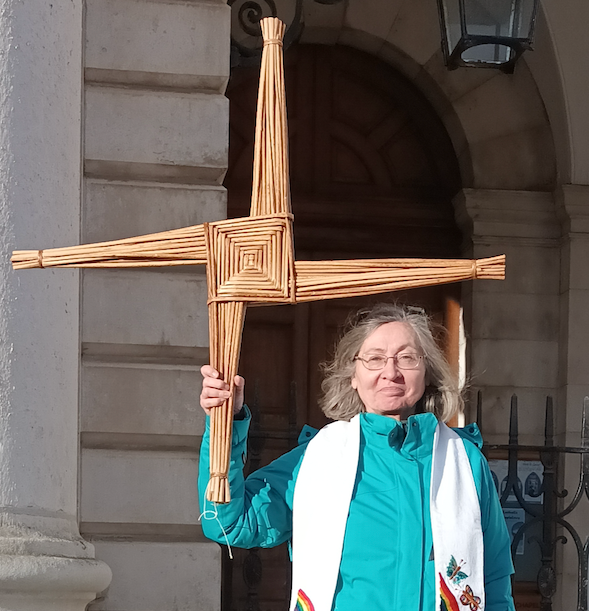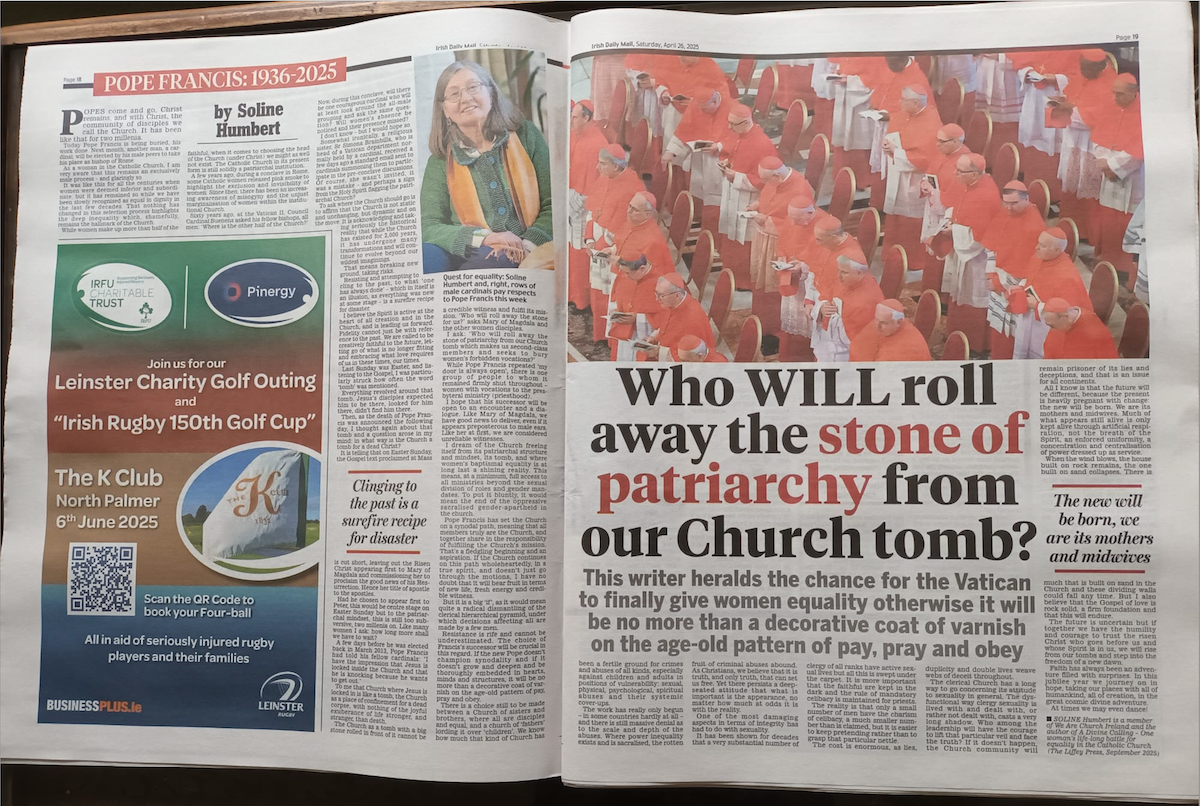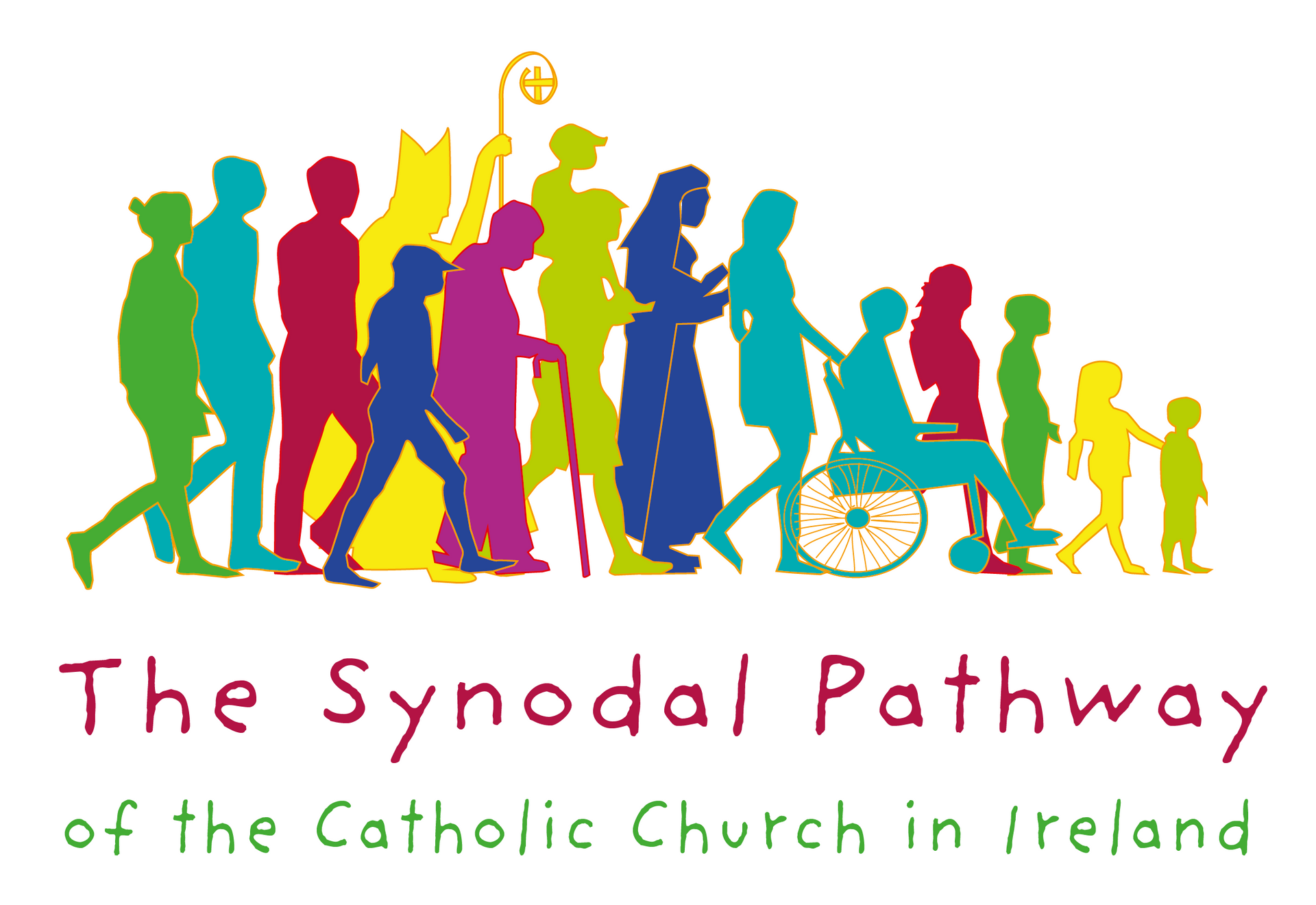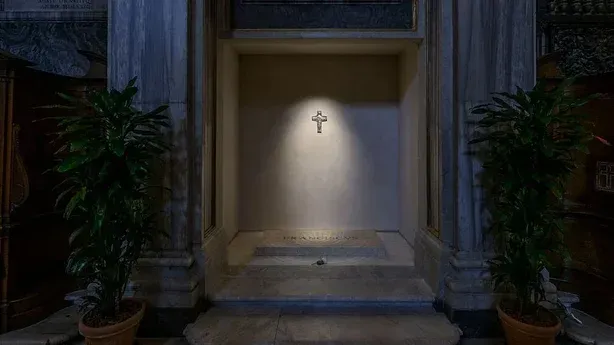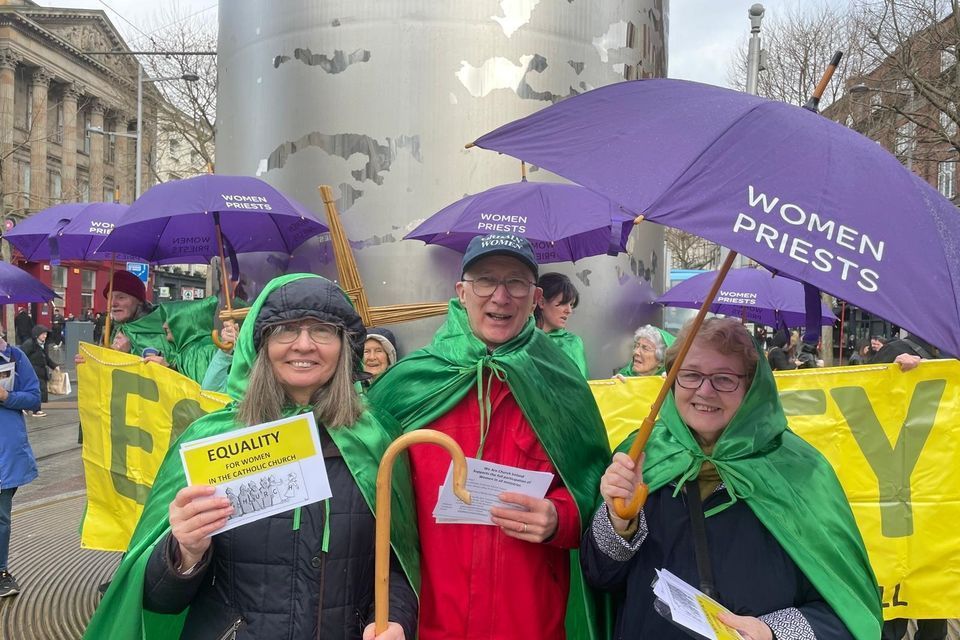We Are Church Ireland Celebrating 25 years
TIMELINE 1997 - 2022
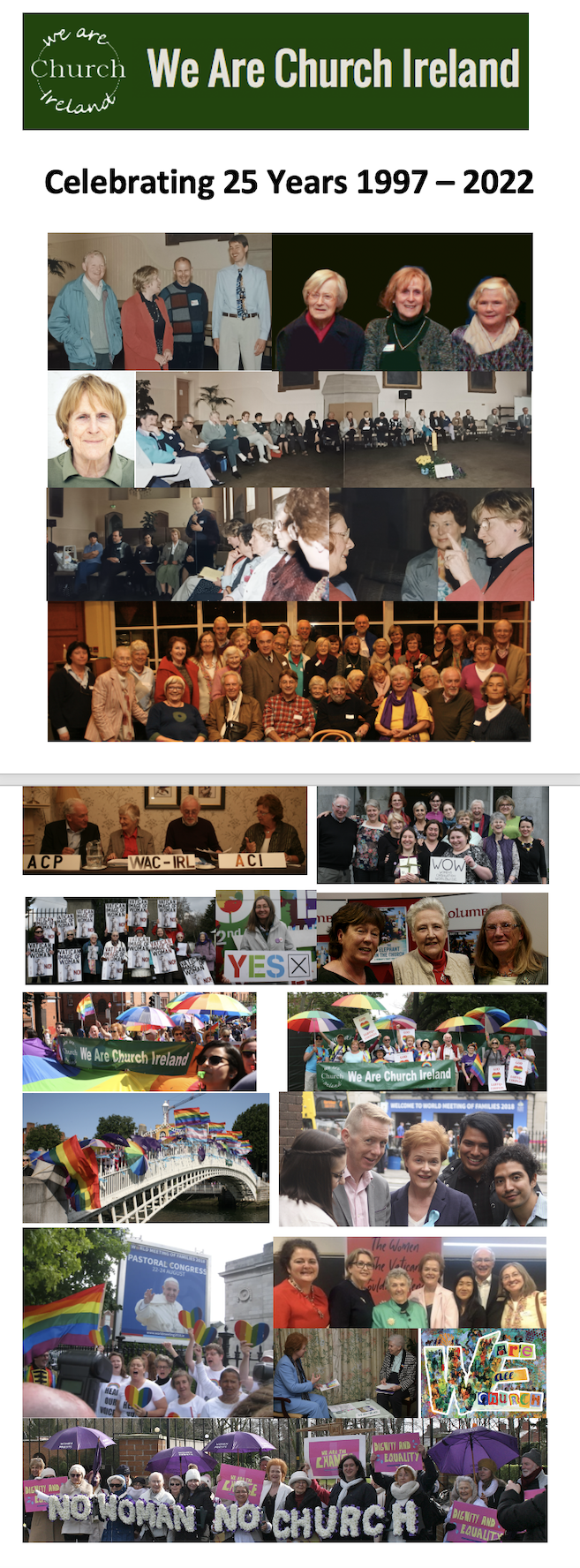
We Are Church Ireland
Charity Reg. No: 20203544
Website: wearechurchireland.ie
Facebook Page: facebook.com/WACIreland
Twitter: @we_irl
Email: info@wearechurchireland.ie
YouTube Channel:
youtube.com/channel/UC5qKZvHT-DOKqdZ_UyFDRtg
Photos on Front Cover:
We Are Church Ireland was founded after a visit by Thomas Arens from Germany who addressed a meeting in All Hallows on 10 May 1997.
The top photo shows Eamonn McCarthy, Helen McCarthy, David Creed and Thomas Arens.
The triumvirate of Helen Costello, Helen McCarthy and Chrissie Brennan.
And some photos from the first meeting in All Hallows.
The last group photo is from a meeting of We Are Church International in All Hallows on 3 November 2013.
TIMELINE
We Are Church Ireland Celebrating 25 years
1995 Wir Sind Kirche in Austria launched a petition for reform in the Catholic Church with 5 goals at Easter 1995. Martha Heizer, Thomas Plankenstein and Bernadette Warnleithner were the initiators. Together with Germany some 2.5 million signed.
1996 The Austrian initiators attended the Call To Action (CTA) conference in Detroit, USA where Hans Küng, Bishop Jacques Gaillot, Paul Collins and Thomas Arens were among the speakers. Helen & Dan McCarthy attended this CTA conference and made contact with the WAC team to ascertain if they would come to Ireland?
1997 Three Irish lay reform groups (BASIC / LEAVEN / POBAL) invited Thomas Arens to come to All Hallows in Dublin on 10 May to speak about the launch of WAC in Germany and Austria. This led to the founding of WAC Ireland with the following on the Core Group:
· Helen McCarthy
· Helen Costello
· Chrissie Brennan
· Catriona McClean
· Liam Deaton
· David Creed
· Phil Dunne
WAC drew up an Irish style petition “Gui An Phobail” (Prayer of the people of God) which was launched on 5 September in All Hallows. Over 1000 signatures were collected. Helen & Dan McCarthy represented Ireland in Rome in October at “Incontro Internazionale del Popolo Di Dio” (International Gathering of the People of God). A Manifesto for the International Movement We Are Church (IMWAC) was drawn up by the delegates.
1998 To raise awareness of what actually happened at Vatican ll Fr Austin Flannery agreed to give two talks (1) “Day of Reflection” in All Hallows, Dublin (2) “Emerging Voices for Renewal & Justice in the Roman Catholic Church today” in the Great Southern Hotel in Galway. Galway contacts: Regina O’Gorman; Jennifer Sleeman; Yvonne Dolan; Sean & Pat O’Conaill; Jo & Joe Curley; Sr Claudine; Liz Roddy. Valerie Stroud from WAC UK attended.
1999 Fr Austin Flannery gave two talks in All Hallows “Vatican ll revisited” (40th anniversary of Pope John XXlll) 24 January & 23 September. Helen & Dan McCarthy visited the Holy Land in October.
2000 Westport Conference. Contacts: Brendan Butler; Bishop Brigid Mary Meehan; Blair Kaiser.
2001 Women’s Ordination Worldwide (WOW) First International Conference held in Dublin organised by BASIC with 300 attending. Vatican attempted to prevent Sr Joan Chittister speaking at this conference.
2002 The Clerical Child abuse scandals gave a new impetus to WAC.
2006 Helen McCarthy represented Ireland at the WAC International meeting in Uppsala, Sweden. Christian Weisner there for Germany.
2007 Helen McCarthy & Helen Costello represented Ireland at WAC meeting in Lisbon, Portugal. Impressive visit to FAVALA. Mass with Bishop Gaillot. Visited restaurant run by women who had been helped by church people to get on their feet. All Hallows meeting on 31 May.
2008 Helen McCarthy & Helen Costello represented Ireland at WAC meeting in Strasbourg.
2009 Helen & Dan McCarthy represented Ireland at WAC meeting in Freising and reported on the Ryan Report. John Allen gave a talk in Dublin. Phyllis Zagano gave a talk in Limerick.
2010 Christian Weisner (WAC Germany) in Dublin to give a talk in Avila (14 February). Donal Dorr meeting with Helen Costello. Castlebar conference (19 August)
2011 In June WAC Ireland was relaunched with a new Core Group:
· Phil Dunne
· Brendan Butler
· Mary Cunningham
· Finbarr Quigley
· Jerry McCarthy
· Jackie Nelson
Press Conference in Buswells Hotel, Dublin. Brendan Butler & Phil Dunne joint leaders.
2012 ACP organised a meeting attended by over 1000 in the Regency Hotel “Towards an Assembly of the Irish Catholic Church” (7 May); IMWAC meeting in Lisbon (16-18 October) attended by Brendan Butler; Advent liturgy in Davenport Hotel (2 Dec); BASIC merged into WAC bringing its “Last Supper” by Bohdan Piasecki which helps raise €1,000 pa with sales of prints & cards.
2013
27 Jan Vigil at Papal Nunciature in support of Fr Tony Flannery
13 May WAC meeting with Sr. Florence Deacon, President of LCWR in the USA who spoke about her meetings in Rome (350 in Milltown Park)
29 Jun AGM speaker: Fr Peter McVerry; Principles of Organisation approved
Aug Maureen Mulvaney and Josette Vassalo attended WOW meeting in Woking
30 Sep Joint Press Conference ACP – ACI – WAC-IRL in Buswells Hotel re letter to Pope Francis from over 100 reform groups (30 Sep);
1-3 Nov International WAC meeting in All Hallows
1 Dec Advent Liturgy in Manresa
15 Dev First edition of WAC Quarterly Newsletter
2014 AGM voted (23 YES, 1 NO; 1 abstaining) to support Martha Heizer to continue in her role as a Co-ordinator of IMWAC after she and her husband Gert were excommunicated for presiding at a Eucharist in their home without an officially ordained priest.
7 Jun WAC AGM: Brian Robertson (WAAC South Africa)
17 Sep MARY T MALONE’S Book Launch “The Elephant in the Church” by Gina Menzies in Marianella
23 Sep "PINK SMOKE OVER THE VATICAN" DVD & Bishop Bridget Mary Meehan
27 Sep "THE ELEPHANT IN THE ROOM" WOW Open Forum Mary T Malone
11 Oct "STARTING A NATIONAL CONVERSATION" ACI
13 Oct "SYNOD ON THE FAMILY" Gina Menzies
10 Nov "THE VATICAN CONGREGATIONS" Dairne McHenry
30 Nov ADVENT LITURGY in Manresa
2015 WAC decided to support the Marriage Equality Referendum, which was passed by 62% on 22 May 2015.
12 Jan "MARRIAGE EQUALITY FOR GAYS & LESBIANS" - Brian Glennon
2 Feb "2015 SYNOD ON THE FAMILY" - Angela Hanley
9 Feb Workshop on 2015 Synod on the Family - Dairne McHenry
14 Feb Vigil at Papal Nunciature in protest at Vatican image of Women (naked torso in bondage) Papal Nucio Charles Brown came jogging by in his shorts. but refused to engage.
25 Feb WAC submission re Synod of the Family
9 Mar "DIVORCED AND REMARRIED" - Finbarr Quigley
13 Apr "DISCRIMINATION FOR ADMISSION TO PRIMARY SCHOOL" - Clem Brennan & Nichola Murphy
13-15 Mar Phil Dunne & Colm Holmes attended IMWAC Meeting in Vienna
13-16 Apr Brendan Butler & Soline Humbert attended ICRN meeting in Limerick
9 May Sr Theresa Forcades in Dublin
11 May "TAKING A CHANCE ON GOD" - DVD; Brendan Fay
6 Jun WAC AGM: Brendan Butler "MONSENOR ROMERO"
14 Sep New WAC Mission Statement
12 Oct "WOW CONFERENCE” - Tony Flannery
9 Nov "NEW BOOK & SYNOD" - Gabriel Daly
29 Nov ADVENT LITURGY in Manresa
2016 WAC promoted the 12 Irish priests calling for debate on the ordination of women
11 Jan "COMMUNICATING THE MESSAGE of WAC Ireland" - Pat Coyle
8 Feb 20 years of Women’s Ordination Worldwide - Soline Humbert & Colm Holmes
14 Mar "Infallibility or Mystery?" - John McEvoy
25 Mar "Justice for Survivors" - solemn procession on Grafton Street
4 Apr "World Day of Prayer for Women’s Ordination" - Candle lit Prayer vigil at St Brigid's Well in Kildare
11 Apr “Woman and Church: Steps on the long journey to inclusion and mutuality” – Mary T. Malone
9 May "Islam and women; Islam and Human Rights; Islam and Jesus" - Dr Ali Selim
25 Jun WAC AGM. "My experience at the hands of the CDF" Gerry Moloney
12 Sep WAC Survey of members: Results and discussion. Survey ranked “Full participation of women “ as our most important objective;
21 Sep WAC endorsed Wijngaards’ Institute Catholic Scholars’ Statement on the Ethics of Using Contraceptives
10 Oct "Personal Experiences of an Inter Faith Journey" - Catherine McCann
17-20 Oct Margaret Lee attended the ICRN meeting in Chicago
4-46 Nov Phil Dunne & Colm Holmes attended IMWAC meeting in Rome
14 Nov "History of Bioethics" - Gina Menzies
27 Nov ADVENT LITURGY in Manresa
2017 The highlight of this year was attending Fr Tony Flannery’s mass with 1000. WAC wrote to 29 bishops asking them to publish their Ad Limina Reports – only 6 replied saying these reports are confidential for the Pope.
9 Jan Film: "Radical Grace"
22 Jan Attended a Mass of Celebration for Fr Tony Flannery’s 70th birthday in Killimordaly Community Hall with over 1,000 present ignoring ban on Tony celebrating mass in public!
13 Feb "Church, Media & Journalism" - Justine McCarthy
13 Mar "How the Catholic Church is irrelevant to many young people" - Anne Marie Butler
25 Mar World Day of Prayer for Women's Ordination: Prayer vigil at St Brigid’s Well in Kildare
10 Apr WAC Members Discussion (Joy of Love and WAC Strategic Plan)
7 May Vocation Sunday - Prayer Vigil in Support of Women's Ordination Worldwide outside Procathedral in Dublin
27 May WAC AGM: “Reforming the Catholic Church” - Gerry O'Hanlon SJ
11 Sep "An Ecumenical Journey in Faith" - Mary Cunningham
2 Oct "Listen with the ear of the heart (St. Benedict): One woman’s poetics of life in and with the Spirit” – Nóirín Ní Riain
29 Oct Reformation Project 500 - Prayer vigils outside churches & cathedrals (including Cathedral in Armagh)
13 Nov Seán Fagan Memorial lecture - Angela Hanley
10 Dec ADVENT LITURGY in Manresa
2018 The highlight for this very busy year was the visit of Pope Francis to Ireland and WAC actions in response
15 Jan Gabriel Daly: "Difference, Division and acceptance of Diversity"
12 Feb Harry van den Akker: "Marienburg- A Movement beyond Church Reform"
10 Mar Annette Esser: “St Hildegard of Bingen”
16-18 Mar At a meeting of WAC International Colm Holmes was elected Chair and Finbarr Quigley joined as Treasurer.
9 Apr Tony Mac Cartaigh: “Being the change”
14 May Sabine Schratz: “Not Up for Discussion – the effect of the Reformation on the culture of debate within the church(es)”
20 May RED for Pentecost – WAC International action
25 May WAC members were urged to follow their conscience in Abortion Referendum (approved by 66%);
31 May Petition to Pope Francis: Change Church LGBTQI Language
16 Jun Brendan Butler & Margaret Lee & Tony Flannery at ICRN conference in Bratislava
16 Jun Mary McAleese in conversation with Ursula Halligan for our AGM (Gonzaga College; 200 attended)
30 Jun WAC applied for a stand in the RDS at World Meeting of Families and were refused – despite lots of stands left empty;
30 June WAC took part in our first Dublin PRIDE March which had the theme “We Are Family” (60,000)
20 Aug Wijngaards Institute launch of LGBTQ project in Trinity College
22 Aug EQUAL FUTURE 2018 Launch at Horse Show House
23 Aug Rainbow Choir HEAR OUR VOICES outside World Meeting of Families at RDS
25 Aug WELCOME POPE FRANCIS – BUT JUSTICE FOR * ABUSED * WOMEN * LGBTQI+ on Halfpenny Bridge with umbrellas and banners
26 Aug Joined Stand4Truth march for TRUTH JUSTICE LOVE
24-26 Aug WOW SC meeting in Kildare
15 Oct WOC Poster action: “Votes for Catholic Women”
28 Nov Joe Mulvaney book launch “Speak Out For Reform” in All Hallows
8 Oct Claire Jenkins: “Male & Female he created them? Perspectives on Transgender in RCC “
12 Nov Joe Mulvaney: “Speak Out For Reform”
2 Dec Advent Liturgy in Manresa
2019 The highlight this year was “The Women the Vatican Could Not Silence”: A conversation between Mary McAleese and Sr Joan Chittister to celebrate the award of the 2019 Alfons Auer Prize to Mary McAleese. With the support of Voices of Faith and Trinity College this event had an audience of 400. (2 Nov).
14 Jan Marie Collins spoke about how Pope Francis and the bishops should tackle the clerical abuse scandals
15 Jan WAC joined GNRC as Member for Ireland
11 Feb Minister Josepha Madigan: “Opening ministries in the church to women” (event moved from MIC to Talbot Hotel)
17 Mar Colm Holmes was elected Chair and Finbarr Quigley Treasurer of WAC International Oscar Romero DVD
8 Apr Sheila Curran: “Immigration”
13 May Mary T. Malone gave a wonderful talk on her book “The Elephant in the Church” in the chapel in Mercy International Centre
8 Jun At our AGM Tina Beattie was the key note speaker: “Women in the Catholic Church: Hopeful but not Optimistic” and she launched our new painting “Last Supper” by Nora Kelly
13 Jun Rev Brandon Robertson: “A Christian Case for LGBT+ Inclusion”
29 Jun WAC Ireland took part in the Dublin PRIDE march (100,000 – second only to the St Patrick’s Day parade!)
9 Sep Sr Nellie McLaughlin: “The Environment”
14 Oct Sharon Tighe Mooney: “Why not me?”
2 Nov Mary McAleese and Joan Chittister in conversation with Ursula Halligan
11 Nov Fr Bernárd Lynch: ”Vatican Hypocrisy and hopes for the future”
1 Dec Advent Liturgy
2020 The highlight this year was our NO WOMAN NO CHURCH rally outside the Papal Nuncio’s residence to mark International Women’s Day (8 Mar). From that date on all our meetings including House Eucharists moved online because of Covid for the next 2 years.
13 Jan Eamon Maher: “The Cultural Legacy of Irish Catholicism from 1979 to date”
10 Feb Fr Roy Donovan: “What does it mean to be Catholic today?”
9 Mar Brian Grogan SJ: "Pope Francis' Gospel Centered Church" (9 Mar);
20 Apr Diarmuid O'Murchu "Expanding our View of Christian Faith Today"
25 May Amanda Dillon: "Women in the Early Christian Church"
15 Jun Jayne Ozanne: "My Story: Just Love"
26 Sep AGM
2 Nov Tony Flannery: From the Outside
23 Nov Anne Soupa: Candidate to become Archbishop of Lyon
29 Nov Advent Liturgy
2021 The highlight this year was that Bishop Paul Dempsey became the first bishop to accept an invitation to give a talk to WAC Ireland! Bishop Paul was probably the youngest person at that event….
2 Feb John O'Brien: The Ordination of Women in the Catholic Church
22 Feb Church Hall Meeting
15 Mar Doris Reisinger: Abuse and Reform in the Catholic Church
2 Apr Good Friday Liturgy: Noirin Ni Riain
21 Apr Valleymount Parish Team: Rita Fernandez and Fr Seamus Ahearne
15 May David Timbs & Peter Wilkinson: Australian Plenary Council
26 May Diarmuid O'Murchu: The Life of Jesus as the Basis for Eucharist
12 Jun WAC AGM: Speaker: Sharon Tighe Mooney: Seeking Scripture - towards a new church
14 Sep Jane Mellett: Laudato Si
12 Oct Bishop Paul Dempsey: National Synodal Assembly
9 Nov Kieran O'Mahony: Restoration of Reformation?
5 Dec Advent Liturgy
2022 The highlight of this year so far would be Ursula Halligan’s interview with Sr Jeannine Gramick – a true prophet for our times.
17 Jan Church Hall Meeting
28 Feb Tom Doyle: Abuse and Cover up in the Catholic Church
10 Mar WAC First Synod Listening Session
24 Mar Sr. Jeannine Gramick interviewed by Ursula Halligan
28 Mar Nicola Brady: Synod and National Synodal Pathway
20 Apr WAC Second Synod Listening Session
27 Apr Phyllis Zagano: Women Deacons and Synodality
28 May AGM: Keynote speaker: Gina Menzies; "25 years of WAC - Is reform of our church on the way?"
Photos on Back Cover:
1. Press Conference in Buswells Tony Flannery; Dairne McHenry; Brendan Butler; Cathy Molloy 30 Sep 2013
2. Mary T. Malone book launch with Gina Menzies and Marie Collins 17 Sep 2014
3. Women’s Ordination Worldwide meeting in An Grianán, 27 Sep 2014
4. Protest at Vatican image of women at Papal Nuncio’s 14 Feb 2015
5. Soline Humbert with YES poster for 2015 Referendum for Marriage Equality
6. Dublin PRIDE march theme “We Are Family” with We Are Church Ireland 30 Jun 2018
7. Pope Francis Visit: EQUAL FUTURE August 2018
8. Pope Francis visit: Rainbow Choir; August 2018
9. Pope Francis visit: Halfpenny Bridge; August 2018
10. Dublin PRIDE march with We Are Church Ireland 29 Jun 2019
11. “The Women The Vatican Couldn’t Silence” – Joan Chittister & Mary McAleese with Ursula Halligan; Siobhán Garrigan; Stephanie Lorenzo; Colm Holmes & Soline Humbert 2 Nov 2019
12. “NO WOMAN NO CHURCH” rally outside Papal Nuncio’s for International Women’s Day 8 March 2020
13. Sr Jeannine Gramick interview with Ursula Halligan 24 Mar 2022
14. WE ARE ALL CHURCH Logo by Nieves Fernandez
